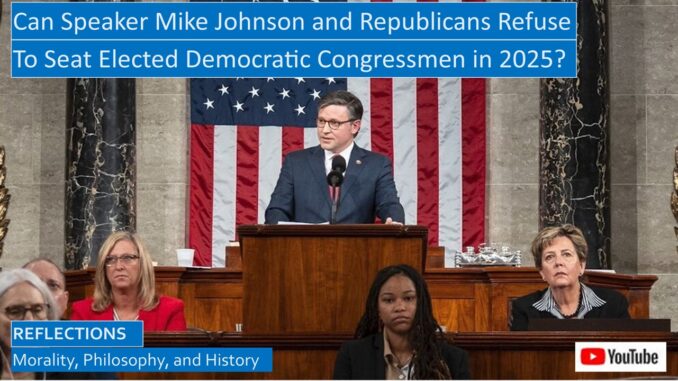
Since the Republicans control the House of Representatives, could Speaker Mike Johnson and the Republicans object to the seating of some, or maybe all, of the duly elected Representatives belonging to the Democratic Party?
This has happened in the past, immediately after the end of the Civil War Congress refused to seat the congressmen elected from the former states of the Confederacy. We ask this important question: Is this valid legal precedent today?
YouTube video for this blog: https://youtu.be/_463DadvOpY
In early 1864, Abraham Lincoln was worried that he would lose the election that November: Civil War casualties were atrocious, and although General Grant was winning solid victories in the Western theater, capturing Vicksburg in the summer of 1863, Robert E Lee was winning Southern victories in the more visible Eastern theater of war around Virginia and surrounding states. But in early 1864, Lincoln appointed Grant to lead all federal forces, and although the Union Army still suffered atrocious casualties, Grant relentlessly attacked and flanked Lee’s Confederate armies, wearing down the Confederacy. Northern morale and Lincoln’s support surged when General Sherman’s Army burned Atlanta, commencing their March to the Sea, destroying Confederate resources, and ensuring that Lincoln would be handily reelected.
Civil War Through Paintings
https://youtu.be/2hoBOSOBUP8
To ensure his reelection, Abraham Lincoln and the Republicans selected Andrew Johnson from Tennessee, a War Democrat, to be Vice-President. They expected that if Lincoln won, it would be by narrow margins, so they were more concerned about Lincoln’s reelection than Johnson’s qualifications. Unfortunately, after Lincoln was assassinated shortly after his Inauguration, President Johnson revealed himself to be a Southern sympathizer hostile to the civil rights of the newly freed slaves.
In the last year of the Civil War, Lincoln had adopted a lenient plan of Presidential Reconstruction. Under President Johnson’s plan of Reconstruction, elections had been held in several Confederate states. The historian Eric Foner notes that “many of these senators and representatives-elect were former Confederate political and military leaders. Their election, together with the unwillingness of the Johnson government to acknowledge the basic rights of the former slaves, Republicans took as evidence that the white South did not fully accept the results of Union victory.”[1]
Even after their defeat in the Civil War, those running for office in the former Confederate South insisted on the right to govern their former slaves in their own way however they wished, enacting harsh black codes that effectively re-enslaved blacks freed in the South, denying their right to vote. Although Mississippi amended its prewar constitution to abolish slavery, she initially rejected the Thirteenth Amendment abolishing slavery.[2] This hubris greatly affected Northern votes and politicians.
The Deep South, the former Confederate states, was a brutal place for the freed blacks. Lynching was a crime that was rarely prosecuted during the Reconstruction, Redemption, and Jim Crow eras, and indeed often members of law enforcement wore the hoods of the KKK. Even when these cases were prosecuted, rarely would a Southern jury convict a white person of murder for lynching blacks.
Ida B Wells, Journalist, Brave Woman, and Anti-Lynching Activist
http://www.seekingvirtueandwisdom.com/ida-b-wells-journalist-brave-woman-and-anti-lynching-crusader/
https://youtu.be/sLDHs0AigvY
Source: The Light of Truth: Writings of an Anti-Lynching Crusader Paperback, by Ida B. Wells
https://amzn.to/3uqdF8X
The history of the Senate recalls that “when the 39th Congress convened on December 4, 1865, some of the newly elected legislators from former Confederate states presented credentials, expecting to be seated in the Senate. Questions about the validity of the credentials prompted the House and Senate to establish a Joint Committee on Reconstruction. This fifteen-member committee, composed of nine representatives and six senators, investigated ‘the conditions of the States which formed the so-called Confederate States of America’ to determine whether they ‘are entitled to be represented in either House of Congress.’ Following its investigation, the committee refused to admit the Southern members.”[3]
Congress assumed control of Radical Reconstruction. Federal troops occupied the Southern states, protecting the civil rights of blacks from the Ku Klux Klan and other white-supremacist terrorists, and also protecting black suffrage. The Southern states would not be represented in Congress until they were readmitted into the Union, a process that took several years. With the support of federal troops, Lincoln’s Republican Party won election to state and federal offices in the South, until federal troops were withdrawn after the disputed federal election of 1876.
Second Founding: The Reconstruction Amendments to the Constitution, by Eric Foner
http://www.seekingvirtueandwisdom.com/second-founding-the-reconstruction-amendments-to-the-constitution/
https://youtu.be/UciDV5laOLg
Source: Second Founding: The Reconstruction Amendments to the Constitution, by Eric Foner
https://amzn.to/3jvz9L9
SUPREME COURT RULING ON SEATING CONGRESSMEN
Had the law surrounding this issue had not continued to evolve, this indeed would be a troubling precedent. But the law did evolve, and in their 1969 Powell v McCormack decision, the Supreme Court under Chief Justice Earl Warren decided that Congress could deny any duly elected Representative their seat in Congress only if they did not meet the narrow list of qualifications for members of the House of Representatives listed in the Constitution. These qualifications are that the member must be at least twenty-five-years-old, have been a citizen for seven years, and live in the district they represent. The House of Representatives had attempted to refuse to seat Adam Clayton Powell, a controversial black congressman who was embroiled in credible financial scandals. There was only one dissent on technical grounds.[4] Thurgood Marshall was an associate justice for this 1969 decision.
NAACP Attorneys Thurgood Marshall and Charles Houston Challenge Jim Crow in the Courts
https://seekingvirtueandwisdom.com/naacp-attorneys-thurgood-marshall-and-charles-houston-challenge-jim-crow-in-the-courts/
https://youtu.be/fBSNQXDziDU
Source: Root and Branch: Charles Hamilton Houston, Thurgood Marshall, and the Struggle to End Segregation, by Rawn James Jr
https://amzn.to/3vErJ1M
If the Republicans try to contest the seating of newly elected Democratic members of the House of Representatives, they will be challenged in court immediately. It is doubtful that the courts will refuse to seat Democratic Congressmen. But those in Congress and the media need to prepare for this possible battle, and research the court cases and judicial precedent, and the recent Supreme Court rulings. This is not wrongly decided precedent, this precedent must not be overturned.
HOW WAS GEORGE SANTOS EXPELLED FROM CONGRESS?
George Santos was expelled under a different provision of the Constitution, which enables the House of Representatives to expel any member by a two-thirds vote. Only six members of the House have been expelled, including three members who were expelled for supporting the Confederacy in 1861, the beginning of the Civil War. Another two were convicted in court, and Santos’ conviction is assured with the number of indictments filed against him.[5]
FAKE ELECTORS SCHEME: 1876 ELECTION WAS NOT VALID PRECEDENT
This question came to my mind after several Trump lawyers were indicted and disbarred from participating in the fake electors scheme in 2020, and several have pleaded guilty in the Georgia RICO case. What is overlooked is that there was precedent for their efforts to contest the counting of the Electoral votes on January 6, 2020. The precedent was when Segregationist Southern Democrats submitted alternate slates of electors in the contested Election of 1876.
Likely those who forwarded the fake slates of Segregationist Democratic Party electors to Congress in 1876 were breaking the law, although none were prosecuted, as many in the South were threatening to restart the Civil War.
A point that confuses many is that under Lincoln, the Republican Party championed civil rights for the freed slaves, while the Democratic Party in the Deep South enacted state Jim Crow segregationist laws. After Nixon, LBJ, Reagan, and the passage of the Civil Rights Acts in the 1960’s, most white voters in the Deep South switched their allegiance from the Democratic Party to the Republican Party.
1876 Contested Presidential Election: Precedent for January 6th Fake Elector Scheme?
https://seekingvirtueandwisdom.com/1876-contested-presidential-election-precedent-for-january-6th-elector-scheme/
https://youtu.be/Ny0iyVYatB4
Source: Centennial Crisis: The Disputed Election of 1876, by William H. Rehnquist
https://amzn.to/3QrI68N
DISCUSSING THE SOURCES
Eric Foner’s Second Founding and WEB Du Bois’ Black Reconstruction provide a window into the Civil War and Reconstruction Eras, and both challenge the Lost Cause myth of the noble Confederate Cause, happy black slaves, instead arguing that the Reconstruction Era sought to reestablish democracy in both the Deep South and America. However, much of the detailed history is from both the Senate’s website and Dr Wikipedia. These books have inspired several reflections.
Second Founding: The Reconstruction Amendments to the Constitution, by Eric Foner
http://www.seekingvirtueandwisdom.com/second-founding-the-reconstruction-amendments-to-the-constitution/
https://youtu.be/UciDV5laOLg
Source: Second Founding: The Reconstruction Amendments to the Constitution, by Eric Foner
https://amzn.to/3jvz9L9
Refuting the Lost Cause: Black Reconstruction by WEB Du Bois
http://www.seekingvirtueandwisdom.com/refuting-the-lost-cause-black-reconstruction-by-web-dubois/
https://youtu.be/JeRCM4PAqPk
Source: Black Reconstruction in America, 1860-1880, by WEB Du Bois
https://amzn.to/3rZHpH0
History of History of WEB Dubois’ Black Reconstruction, Challenging Lost Cause Myth and Dunning School
https://seekingvirtueandwisdom.com/history-of-history-of-web-dubois-black-reconstruction-challenging-lost-cause-myth-and-dunning-school/
https://youtu.be/CK4V3e-TPFU
[1] Eric Foner, Second Founding (New York: WW Norton & Company, 2019), p. 56.
[2] Eric Foner, Second Founding, p. 38.
[3] https://www.senate.gov/artandhistory/history/common/civil_war/VictoryTragedyReconstruction.htm and
https://en.wikipedia.org/wiki/United_States_Congressional_Joint_Committee_on_Reconstruction
[4] https://en.wikipedia.org/wiki/Unseated_members_of_the_United_States_Congress and https://en.wikipedia.org/wiki/Powell_v._McCormack and https://en.wikipedia.org/wiki/Article_One_of_the_United_States_Constitution#Clause_2:_Qualifications_of_Members
[5] https://en.wikipedia.org/wiki/George_Santos and https://en.wikipedia.org/wiki/List_of_United_States_representatives_expelled,_censured,_or_reprimanded

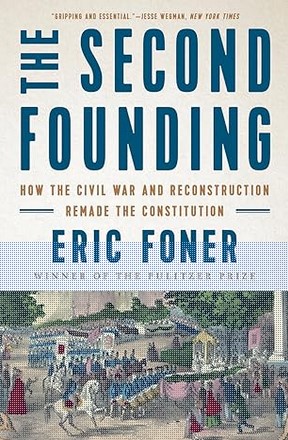
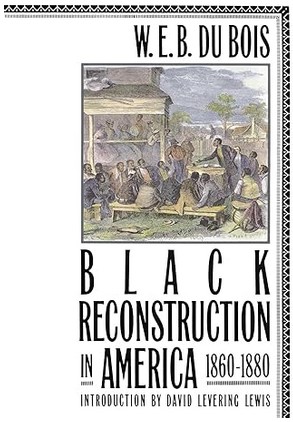
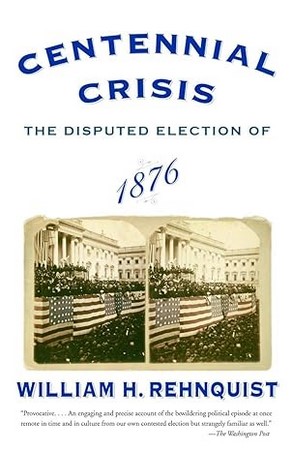
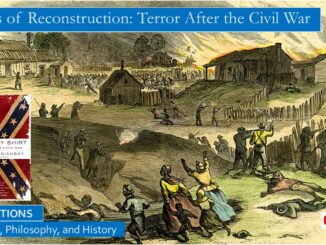
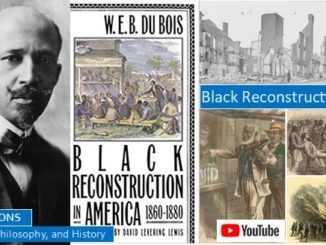

Be the first to comment